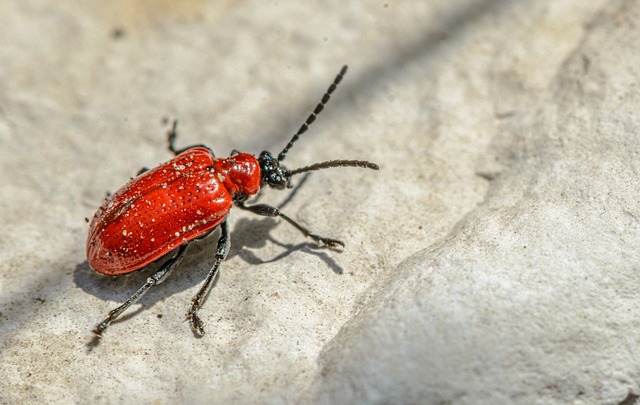The Marana region near Tucson faces a variety of pest challenges, with mice, rats, Argentine and carpenter ants, cockroaches, and termites commonly affecting homes and businesses. These pests exploit the area's unique environmental conditions, including its arid climate and diverse habitats, to thrive year-round. Early detection and prevention are crucial for managing these infestations; this involves regular maintenance, sealing entry points, and maintaining cleanliness. When infestations do arise, it's essential to engage professional pest control services Tucson for effective treatment. These experts offer tailored solutions that align with Marana's ecosystem, utilizing integrated pest management (IPM) techniques to balance ecological preservation with the need for a pest-free environment. By combining biological controls and selective chemical interventions, Tucson's pest control services provide sustainable and efficient pest management strategies for residents and businesses in the area.
Marana’s diverse ecosystem presents a unique set of challenges for homeowners and farmers alike, with a variety of pests thriving in its environment. This article delves into the common pests found in Marana and the strategies available to manage these unwelcome inhabitants effectively. From understanding the climatic factors that influence their populations to exploring the latest pest control services Tucson has to offer, readers will gain valuable insights into both preventative measures and modern control methods tailored to the region’s specific infestation concerns. Whether dealing with the destructive nature of termites or the health risks posed by bed bugs, this comprehensive guide will help protect homes and crops from these pests, emphasizing the importance of professional intervention for long-term pest eradication and management.
- Identifying Common Pests in Marana and Their Behaviors
- 1. Overview of Marana's Climate and Environmental Factors Influencing Pest Populations
Identifying Common Pests in Marana and Their Behaviors

In the region of Marana, nestled near Tucson, a variety of pests pose challenges to local homes and businesses. Identifying these common pests is the first step in implementing effective pest control measures. One prevalent group includes rodents such as mice and rats, which are adept at entering structures through small openings. Their presence can be detected by droppings, gnaw marks, or the sound of scurrying in walls or ceilings. Ants are another frequent invader, with species like Argentine ants and carpenter ants capable of establishing colonies close to human habitations. They forage for food and can quickly contaminate food sources with their trails. Additionally, cockroaches, including the American and German varieties, thrive in warm environments and are attracted to food debris and moisture. Their sighting often indicates an established infestation that requires professional pest control services Tucson for eradication. Understanding the behaviors and entry points of these pests enables residents and businesses to take proactive measures against them. Regular maintenance, sealing potential entry points, and prompt sanitation can significantly reduce the risk of infestation. When pests do become a problem, it’s crucial to engage with professional pest control services Tucson for safe and effective treatment options tailored to the local Marana environment. These experts are equipped with the knowledge and tools necessary to address each type of pest effectively, ensuring that your property remains pest-free.
1. Overview of Marana's Climate and Environmental Factors Influencing Pest Populations

Marana, located within Pima County in Arizona, benefits from a predominantly arid climate characterized by hot summers and mild winters. This semi-desert environment is conducive to a variety of pest species, which thrive in the warm, often dry conditions. The regional biodiversity, coupled with the presence of various ecosystems ranging from desert landscapes to suburban settings, provides ample habitats for pests such as ants, rodents, and termites. The consistent temperatures throughout the year ensure that these pests have a prolonged breeding season, posing challenges for local homeowners and agricultural sectors. The use of professional pest control services in Tucson is essential to manage these populations effectively, given the area’s unique environmental factors. These services employ a range of strategies tailored to the specific pest infestations, leveraging both eco-friendly and conventional methods to safeguard properties and promote a comfortable living environment.
Environmental conditions in Marana can also exacerbate pest issues due to the region’s vegetation and water availability. The abundant desert flora not only attracts certain insect species but also creates moisture pockets that can harbor rodents and other pests. Additionally, irrigation practices for agriculture and landscaping can inadvertently provide a buffer for pest survival. As such, integrated pest management (IPM) approaches are increasingly being adopted by pest control services in Tucson to address these environmental influences. IPM combines common-sense practices with natural predation and environmentally responsible chemicals to control pests, ensuring the ecological balance is maintained while effectively protecting homes, businesses, and crops from unwanted pests.
In conclusion, Marana’s unique environmental conditions provide a conducive habitat for a variety of common pests. Understanding the behaviors and characteristics of these pests is crucial for effective pest management. Residents and businesses in Marana can rely on local pest control services Tucson to develop tailored strategies to mitigate infestations effectively. By staying informed and proactive, the community can safeguard its homes, workplaces, and outdoor spaces from the challenges posed by these unwelcome inhabitants. With expert guidance and preventive measures, Marana residents can maintain a comfortable and pest-free environment throughout the year.
